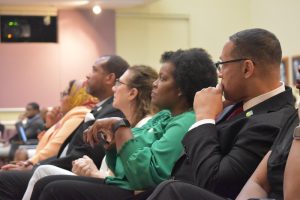In a contentious vote Monday night, the City Council voted against re-implementing ShotSpotter in Durham.
ShotSpotter, which uses acoustic sensors to detect gunshots and notify police, was deployed in a region of Durham with high rates of gunshot incidents for a year-long trial during 2023.
That trial ended in December after council members voted against continuing the contract. But after a recent report from the Wilson Center for Science and Justice at the Duke University School of Law reopened questions about the technology, ShotSpotter was back on the council’s agenda..
Mayor Leonardo Williams, in his signature red glasses and matching red tie, began the ShotSpotter discussion by giving each citizen who was signed up to speak two minutes.
“We’re starting out spicy tonight,” Williams said, referring to the long list of speakers ahead.
Of the more than 15 people who spoke, only one urged the council to vote to continue the use of ShotSpotter in Durham.
Seth Hurley, a high school senior from Durham School of the Arts, urged the council to vote “no.”
“The HEART program saves lives,” said Hurley, citing a Durham crisis response program that deploys mental health clinicians to help respond to 911 calls. “ShotSpotter does not.”
King Sage, a resident of East Durham, where the technology was tried, said ShotSpotter is a bad use of Durham’s resources. “I never once heard my neighbors seriously say that we needed more policing and surveillance,” said Sage.
Brittney Price, who lives a couple blocks north of a ShotSpotter sensor, told the council of the time she lost a loved one to gun violence, when she was living in a different city. The gunshots that killed him were picked up by ShotSpotter but dismissed as not being gun fire, she said.
Generally, the conversation centered around whether ShotSpotter effectively addresses the issue of gun violence and whether its implementation results in heightened policing in communities, potentially exposing them to greater risks.
When it was time for the council members to vote, the numbers mimicked exactly what happened last December: a 4-2 vote, with Middleton and Williams voting yes, and the other four council members voting no.
Chelsea Cook, who was recently appointed to City Council, found the data in the recent study uncompelling. “Only two confirmed shots with wounds were ShotSpotter-only calls,” said Cook. In the more than 90 remaining instances, incidents reported by ShotSpotter were also reported by 911 calls, she said. To Cook, that duplication suggested a lack of necessity for this expensive program.
“This is not the right technology for Durham, I will not be supporting it tonight,” said Cook.
Also voting no were council members Nate Baker and Carl Rist. Baker cited data from the Wilson Center report. Rist found the results from the recent report inconclusive and noted the skepticism expressed by Durham residents.
By contrast, council member Mark-Anthony Middleton has firmly supported ShotSpotter since its arrival in Durham.
He wanted to talk about North Carolina Central University, where scholars hoped to try the technology. Middleton addressed the comparison between the HEART program and ShotSpotter, saying they can absolutely co-exist, and HEART should not be used as an alternative to ShotSpotter.
“They are two totally different lanes,” said Middleton.
Council member Javiera Caballero said Durham should be careful in how it allocates its resources.
“We don’t have a money tree,” said Caballero.“I said no in 2019, I said no when it came up in 2022 for a vote, and I said no this evening.”
Finally, it was Williams’ turn. He called up Chief of Police Patrice Andrews, adding that when he was a teacher, he hated when school board members, not teachers, made the decisions.
“None of us are police officers,” said Williams.
“Any amount of time reduction is a positive thing,” the chief said. “ShotSpotter is a tool…. It’s just one more tool in our whole repertoire of investigative tools and resources that we have.”
Though Williams and Middleton voted in favor, a 4-2 vote brought ShotSpotter to the ground once again. Durham will not be seeing this technology in its streets for the foreseeable future.






